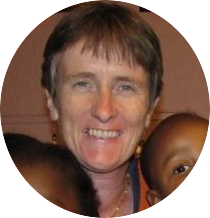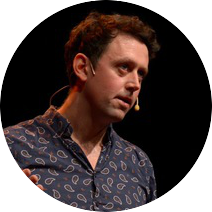Humanitarian Of The Year
Lifetime Achievement Award

Gena Heraty
Mayo woman Gena Heraty was named Irish Red Cross Humanitarian of the Year at the Irish Red Cross Humanitarian Awards which took place in the Ballsbridge Hotel, Dublin last night.
Gena Heraty arrived in Port-au-Prince, Haiti in 1993 and almost three decades later is known all over Haiti for challenging prejudice against people with physical and intellectual disabilities. Conditions are extremely challenging in Haiti, and Gena has faced a vicious attack by armed men, where one of her colleagues was killed.
Gena is the Coordinator of the Special Needs programme with Nos Petits Freres et Soeurs (NPFS), a home for orphaned and abandoned children. Gena’s team has developed an outreach programme which provides education for over 100 school children with neurological disorders while approximately 80 patients a day (or 30,000 a year) receive physical therapy treatments. Gena is the co-founder of the Kay Christine home for children with special needs at NPFS which has created services to ensure children with special needs are not abandoned.

John Lonergan
When John Lonergan walked into his first day of work in Limerick on 8 March 1968, he couldn’t have known he was embarking on a 42-year-long career in the Irish Prison Service.
After three years in Limerick, John moved to Shanganagh Castle in Dublin and following this, John worked in a number of prisons and institutions including Loughan House in Co Cavan when it accommodated teenagers aged 12-18. In 1984, John was appointed Governor of Mountjoy Prison and four years after that, in 1988, he was transferred to the high-security prison in Portlaoise to deal with the complexities arising there from the incarceration of people involved in the Troubles. John served as Governor of Portlaoise Prison until 1992 when he moved back to Mountjoy, where he again served as Governor until he retired in 2010.
In the words of Irish Red Cross Chairman Pat Carey, “John Lonergan brought humanity into the prison system and had a profound effect on Irish society in terms of its understanding of who was in prison – and why.” John was one of the first people to draw the public’s attention to the origins of crime in Ireland, and the connection between criminality and the social, economic and educational circumstances of prisoners and their families: this was a wake-up call for Irish society and Government. While Governor of Mountjoy, John’s analysis revealed that 75% of Dublin-born prisoners were from six small communities in Dublin city.
John was avant-garde in his rehabilitative approach to managing prisons. He recognised the importance which mental health and having hope for a better future played in prison life and he set about making the regime more humanitarian for those in prison by enhancing and promoting opportunities for education, training and building self-esteem. John opened up Mountjoy to facilitate contact with the outside world, through career development, football, music and theatre. This enabled outside groups to begin their development work in Irish prisons which have continued to this day. One of these was the Irish Red Cross, which in 2009 began its work within prisons by assisting in the development of health, first aid and non-violence programmes which are now in all Irish prisons. These have enabled prisoners take control of their own lives, and have helped transform the environment of Irish prisons for staff and prisoners.
John paved the way for many changes in the prison service, and was instrumental in lobbying for the development of a new women’s prison, the Dóchas Centre. He also oversaw the development of a prisoner visitor centre at Mountjoy which was later replicated across the country.
“We are recognising John Lonergan with the Lifetime Achievement Award for the stand he took, and the noise he made to make the everyday lives of people in prison more bearable,” said Pat Carey. “John saw the opportunity to help others in a real, practical and meaningful way and he made it his mission to overcome whatever obstacles stood in his way. He did something not because it was popular, but because it the right thing to do and this, surely, summarises the true spirit of humanitarianism.”
Journalism
Excellence
Award

Sally Hayden
Sally Hayden is a journalist and photographer who focuses on conflict, migration and humanitarian crises. She has reported across Europe, the Middle East and Africa for outlets including the BBC, The Irish Times, TIME, CNN, Al Jazeera and The New York Times. Sally’s investigation into the arrest and torture of refugees returning to regime-held parts of Syria won first prize in the 2018 European Migration Media Awards. Her investigation into corruption in the UN Refugee Agency in Sudan led to a staff member being found guilty of abuse of power and soliciting bribes. For over a year, Sally has been in daily contact with refugees in Libyan detention centres, who use hidden phones to send evidence of human rights abuses.
Young Humanitarian Award

Donal Walsh #Livelife Foundation
The Kerry-based Donal Walsh #LiveLife Foundation was named winner in the Young Humanitarian category.
Donal Walsh touched the hearts of the nation when he came to prominence through his writings and appearance on Brendan O’Connor’s The Saturday Night Show. While Donal battled cancer he became very aware of the effect his illness was having on his family and friends. Donal’s experience of fighting to live spurred him on to address, publicly, an issue which he was in a very unique position to comment on: teenage suicide.
The #LiveLife Foundation was set up after Donal died, to promote his anti-suicide message and to fundraise. Donal found there were not enough facilities in hospices, in terms of teenage mental health and faith, both of which were a big part of Donal’s life. Donal’s Foundation has now raised and distributed €500,000 to help develop these facilities. Donal also worked tirelessly and raised €65,000 for the children’s hospital in Crumlin.
Innovation For Change Award

Austin Campbell My Streets Ireland
Austin Campbell is founder of My Streets Ireland which trains people who are homeless to become walking tour guides of their own city. My Streets runs three-month training courses focused on confidence and presentation skills, creative writing, research and tour guiding, and offers graduates the opportunity to become paid tour guides. All of the My Streets Ireland guides have experienced or are experiencing homelessness and they understand the streets that run through our towns and cities better than anyone else. The aim of the programme is to help the guides to educate the public about their lives and to foster empathy. My Streets Ireland has attracted 12,000 customers to date. Austin is also director of Robert Emmet CDP a community development project which gives voice and opportunity to the underserved in south west inner city Dublin.
Corporate Impact Award

Aldi
Aldi was named winner in the Corporate Impact category. Aldi has been introducing and implementing initiatives to tackle climate change step by step over the past number of years. Every Aldi store in the UK and Ireland now has an Energy Management System, using energy-saving technology and employee awareness to help achieve the most efficient energy consumption possible.
Another example of their work in this area is reducing fuel consumption through fuel-efficient tyres and investment in fuel management systems, while LED lighting saves on carbon. Aldi has also upgraded fridges, freezers, and other appliances with environmentally-friendly equipment.
Aldi is also offsetting its remaining carbon footprint via carbon offset projects in Peru, India, Vietnam and Ghana.
